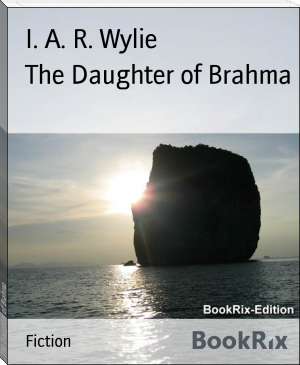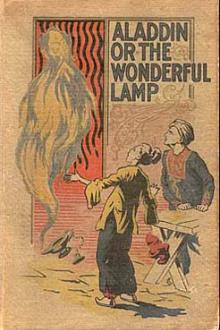The Daughter of Brahma - I. A. R. Wylie (ereader iphone .TXT) 📗

- Author: I. A. R. Wylie
Book online «The Daughter of Brahma - I. A. R. Wylie (ereader iphone .TXT) 📗». Author I. A. R. Wylie
"Yes, of course. But we shall see you again soon? ''
"Yes. Good-bye and thank you."
He slipped into the shadow. He heard Hatherway's voice and her answer, and at the gate he looked back and saw her white, nobly proportioned figure pass, phantom-like, through the shadows, into the light. He saw Hatherway at her side, and suddenly he clenched his fists, grinding his teeth in a storm of fruitless passion.
Outside on the high-road a few Sudras had gathered together in an idle group, watching and listening. For the most part they were dressed in the costume prescribed by Mr. Eliot as Christian, but a woman, scarlet-clothed and hung with tawdry ornaments, came out from their midst and touched Hurst on the arm.
"Lord Sahib, come to the bazaar," she said hoarsely. "Much fun for Sahib Sahib come?"
He looked down into her face. A torch, held by one of her companions, lit up the evil yet piteous features, and threw flickering points of fire into her upturned eyes. He stared back at her. The sense of his absolute freedom from all bonds of duty, of affection, of responsibility rushed over him with appalling violence. He stood alone, mentally and physically outcasted from among his fellows, but with all their capabilities of experiencing joy and sorrow, love and hatred. Moreover, the old lassitude had gone; something had been aroused in him there was youth in his blood a suppressed, seething vitality. He took out an English sovereign and spun it, whilst the woman watched him in stupid wonder.
"Tails the Professor; heads the devil!" he said aloud.
The coin turned up heads. But in that moment his eyes passed to the distant outline of the hills; memory swept him back twelve years to another night when he had stood as he stood now alone. He had seen a child held up into the moonlight, and she had smiled at him as she seemed to smile at him now over the wild ocean of ruthless passion. The memory gripped him, held him by the power of its sheer beauty.
He flung the gold piece at the woman's feet, and limped off into the darkness.
BOOK II_CHAPTER IV (SARASVATI)THE Temple to the Unknown lay in shadow. The stars had gone out, passing silently, like sentinels whose watch is done, and the frail sickle of the moon dropped behind the hills, leaving the world to a last hour of rest. The very air slept. No breeze stirred the sacred pool whose surface stretched grey and sullen beneath the deserted sky, and the leaves of the botrees at the water's edge hung silent in the waiting hush which precedes the dawn. Darkness painted itself on darkness. The mighty pillars of the temple threw their deeper shadow against the unlighted heaven and at their base night lingered sable and impenetrable. Only in the midst of the waters a single spark of light shone out amidst the gloom. The pool caught the reflection and drew it into its depths, where it glowed sombrely like the red eye of some monster hidden below the placid surface. Majestic and oppressive, the Gopuras rose up on either hand and watched the distant horizon for the first heralds of the coming day. And at their feet the sanctuary lay wrapped in dreamless slumber.
Two men came out of the black shadows by the great gateway. They crossed the first court, and, without speaking, reached the water's edge, where a barge lay moored. They entered and cast off, and the younger of the two took the oars and rowed towards the island-shrine whose lights signalled to them through the darkness. And still the silence remained unbroken save for the soft gurgle of the water against the gunwale and the splash of the oars as they sent long ripples over the sleeping pool. Presently the rower stopped and rested for a moment, his face lifted to the sky.
"Surely there is no silence like this in the world," he said in a whisper. "It seems a living thing."
"The Spirit of Generations untold broods here at daybreak," his companion returned poetically. "Are you afraid? >:
The other answered with a laugh.
"Of what? Was I afraid last night when those devils brushed against us? And what is there to fear, after all? Death? WeU, we all die."
He rowed on, and the elder man smiled grimly to himself in the darkness.
"You are young, and the young are always tired of life," he observed in his guttural tones. "But here it is not death we fear a thing more subtle than death."
"Fate, perhaps? I feel her very close to me."
"She is with you always in your own heart. But you know her not. Your soul sleeps, and sees not her greater sister. But in such hours as these she awakes and knows." The speaker stretched out his powerful arms. "It is good when she awakes if only for a little," he said. "Then is God in us."
Hurst nodded absently. The blood-red eye drifted past them, and he watched it in fascinated silence. An icy breath which seemed to rise from the stagnant water brushed his cheek. A moment later the keel grated against the ground. Yet he did not move. He looked across at his companion, whose bearded face had become faintly visible in the new mysterious brightness of the atmosphere. And he laughed again, but the laugh no longer sounded so harsh. There was a note of uncertainty in it which he strove to suppress with an angry impatience.
"I believe after all I am afraid," he said grimly. "Tell me what you see. What is behind me? I tell you, my nerve's gone God knows why. This silence this atmosphere is worse than a hundred of those devil's orgies. What are you looking at?"
Heilig made no answer. He crossed the space dividing them, and took the younger man by the shoulders.
"Look yourself!" he said in a sharp undertone. "Are you a coward?"
Hurst turned slowly. He felt the ghostly light upon his face, and yet for a moment he looked away, fearing he knew not what, overwhelmed by the instinctive recognition of a relentless destiny which stood and waited. Then he raised his head. Immediately before him rose the rocks against which their barge had struck, and above them the graceful outline of the island-shrine. The door stood open. Like a picture painted on a canvas of darkness, he saw the faded golden walls, the low altar upon whose bejewelled table an idol, cross-legged and bearing Siva's sacred trident, sat in threatening supremacy. A single lamp hung from the centre of the low roof; its subdued light lit up the god's loathsome features, and sank like a crimson haze upon the altar-steps, where countless lotus-blossoms lay massed in dying loveliness.
Hurst saw these things unconsciously as details in some dream whose central figure held him spellbound, bereft of thought, almost of emotion. Sarasvati knelt before the altar, her back to it, her face turned to the open doorway, her eyes fixed sightlessly on the dark waters beyond. As though the lotus-blossoms had exhaled their spirit into a woman's form, she rose from out their midst, white-clad, unadorned save for the flowers which crowned the dark glory of her hair and fell in garlands from about her shoulders into her unconscious hands. Her face was a little raised, her lips, cut in lines of noble sweetness, were a little parted, as though she thirsted. Yet her eyes were dead. They stared out from the perfect oval of her face like lamps whose flame has been extinguished, and only the glow beneath the olive skin and the soft rise and fall of the silken scarf across her breast spoke of the warm, flowing life beneath.
Hurst sat motionless, his elbows on the gunwale, his chin supported in his hand, and watched her. Thought above all, memory flooded back to him as though somewhere in his brain a tiny yet fatal clot of blood had melted, setting free a long-thwarted tide. The morbid rage against his kind and against himself passed like an evil dream. All existence, even to his own, seemed glorified in this one perfect being, and with this recognition of perfection, of the supremely beautiful, came a deep sense of freedom, of release from a crushing, stupefying burden. Without turning, he felt for Heilig's hand and grasped it feverishly.
"Is she asleep?" he whispered.
"She hears and sees us not," Heilig answered. "But also she sleeps not. Her soul is with Brahma, where there is no thought, no passion, no desire, only an endless contemplation."
"Her eyes are lifeless. How divine her eyes would be if she never awake?"
"Not if the dear God is merciful."
Hurst asked no further. He sat on motionless and silent, unconscious that the darkness behind him had melted into the luminous grey of dawn, and that the lamp above the altar had faded. And suddenly a shaft of light fell upon the dreamer's face, and spread about her, enveloping shrine and god in one golden splendour.
"Come," Heilig said imperatively. "In a little while those devil- worshippers of hers will return. There is danger. Rouse yourself!"
Hurst seemed not to hear him, and Heilig took the oars and carried them to his place. "Thy own soul seems not of the wakefullest," he muttered in his own language. He began to row vigorously towards the shore, and with an oath the young man at the prow turned upon him, his fists clenched, his black brows contracted.
"Stop!" he said savagely. "What are you doing? Do you mean to leave her there to those fiends?"
Heilig continued to pull stoically at the oars.
"What would you haf me do?" he asked.
"Save her take her with you anything--"
"And set fire to God knows what powder-mine? My friend, do you share Herr Eliot's complacent belief that Indian fanaticism is dead? And what haf you to offer Sarasvati, the divine daughter of the gods? Will you gif her to your parson to Christianise? Will you let her serve as ayah to your honourable mother? Will you make her as those miserable outcasts whose faith you haf trampled underfoot?" His big voice softened. "No, no; leaf her to her fate such as it is; it is the one to which she was born. Leaf her to her dreams and to this, her world." Hurst put his hand to his head like a man waking from a long sleep.
"I beg your pardon," he stammered. "For a moment the thought made me mad but you are right it would be cruel a hell for a hell. And she belongs to this--" He broke off and looked about him, the tense muscles of his face relaxing gradually, as though the beauty of the transformed world sank into his very soul. "It is all part of her," he added, half to himself.
In silence they reached the rough landing-place. The dawn was passing slowly into day, and, though the phantom night-shadows still lingered in the temple courts, the minarets and pillars bathed their highest points in the golden glory of the sunrise, and threw their proud reflections into the sacred pool beneath them. And life awoke. The waters rippled against the walls of their rocky prison, beating out a soft,





Comments (0)